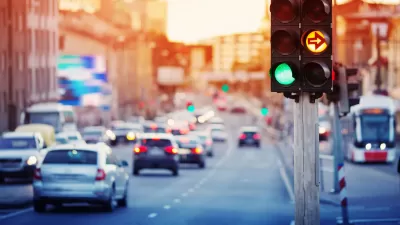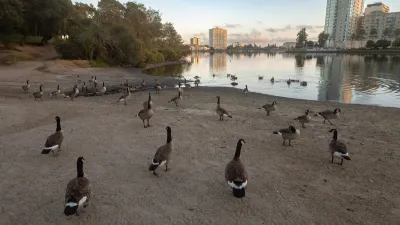Grist's David Roberts attended a national conference on the future of transportation at Ohio State in early May and noticed a divide in the concluding discussion on how panelists approached the issue of sustainability in transportation.
Roberts attended Moving Ahead 2010: Sustainable Transportation Solutions for the 21st Century from May 2-4. An impromptu panel discussion prompted by the Deepwater Horizon calamity and our oil dependence closed the conference. Roberts was struck by the two distinct approaches to transportation sustainability revealed in the discussion.
"On one side, you have people like Scott Bernstein of the Center for Neighborhood Technology, Geoff Anderson of Smart Growth America, or Tom Murphy of the Urban Land Institute, who are focused on using land and urban assets more effectively, which means increasing density and walkability, which means driving less, which means fewer cars.
"On the other side you have people whose focus is on reducing the ecological impact of individual cars." Their focus: "People are going to keep driving like they do now; how can we make their cars cleaner?"
After listening to the Honda spokesman discuss what he sees as the auto company's future presented by fuel cell technology, Roberts concludes: "Is that really the extent of our ambition? To switch out the internal combustion engine for some other widget and otherwise keep on motoring as usual? To maintain the patterns of land use and development we have, simply with cars that emit less pollution? The poverty of that vision is tragic."
FULL STORY: Does ‘sustainable transportation’ mean better cars or fewer cars?

Alabama: Trump Terminates Settlements for Black Communities Harmed By Raw Sewage
Trump deemed the landmark civil rights agreement “illegal DEI and environmental justice policy.”

Study: Maui’s Plan to Convert Vacation Rentals to Long-Term Housing Could Cause Nearly $1 Billion Economic Loss
The plan would reduce visitor accommodation by 25% resulting in 1,900 jobs lost.

Planetizen Federal Action Tracker
A weekly monitor of how Trump’s orders and actions are impacting planners and planning in America.

Wind Energy on the Rise Despite Federal Policy Reversal
The Trump administration is revoking federal support for renewable energy, but demand for new projects continues unabated.

Passengers Flock to Caltrain After Electrification
The new electric trains are running faster and more reliably, leading to strong ridership growth on the Bay Area rail system.

Texas Churches Rally Behind ‘Yes in God’s Back Yard’ Legislation
Religious leaders want the state to reduce zoning regulations to streamline leasing church-owned land to housing developers.
Urban Design for Planners 1: Software Tools
This six-course series explores essential urban design concepts using open source software and equips planners with the tools they need to participate fully in the urban design process.
Planning for Universal Design
Learn the tools for implementing Universal Design in planning regulations.
Caltrans
Smith Gee Studio
Institute for Housing and Urban Development Studies (IHS)
City of Grandview
Harvard GSD Executive Education
Toledo-Lucas County Plan Commissions
Salt Lake City
NYU Wagner Graduate School of Public Service




























